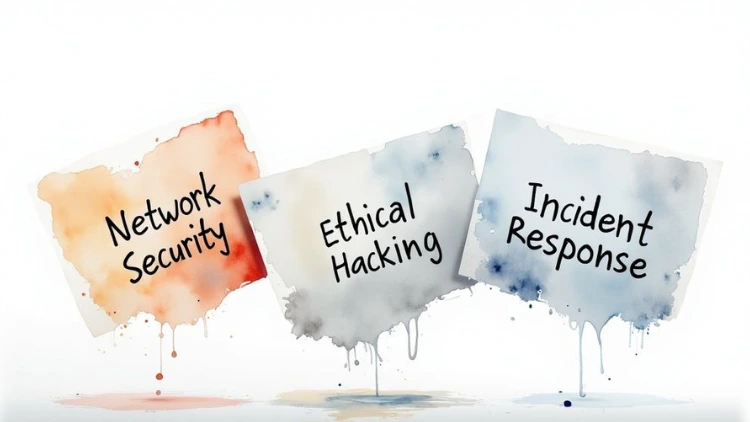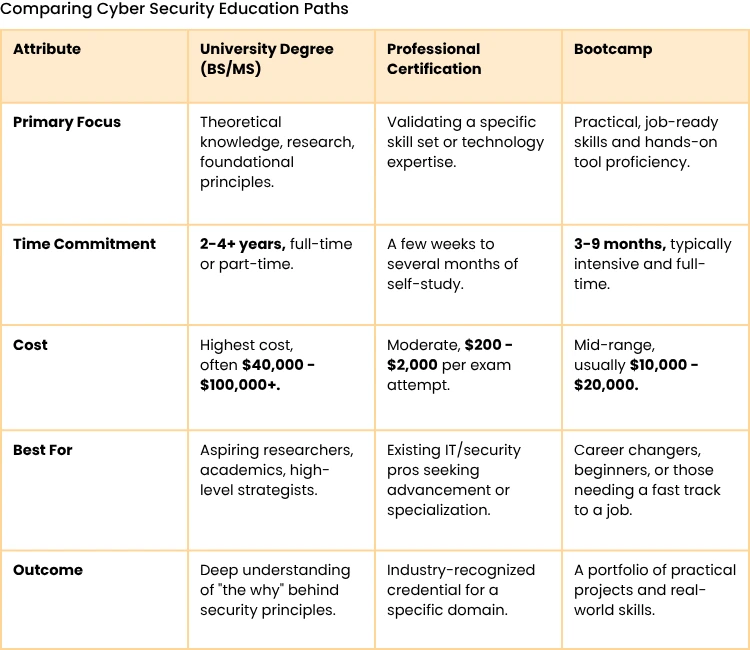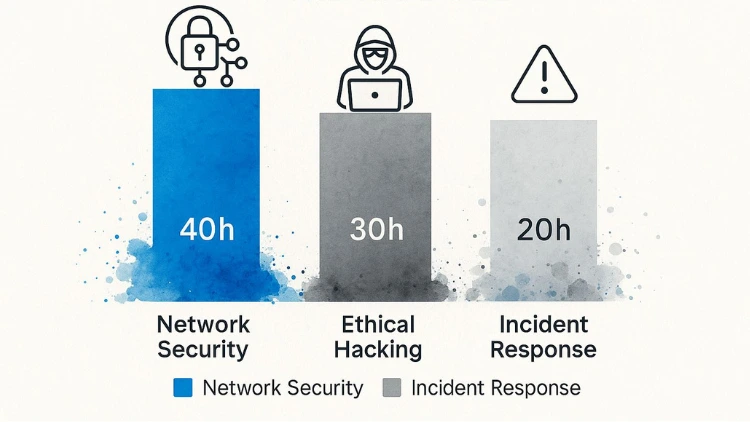Find the Best Cyber Security Course for Your Career

A cyber security course is essentially a structured training program that teaches you how to protect computer systems, networks, and all the data flowing through them from digital threats. This kind of training gives you both the foundational knowledge and the practical skills you’ll need on the front lines, making it the perfect launchpad for a career in a seriously hot industry.
Jump To Section

Earn As You Learn
Earn 25% commission when your network purchase Uplyrn courses or subscribe to our annual membership. It’s the best thing ever. Next to learning,
of course.
Why a Cyber Security Course is a Smart Career Move
In a world that’s more connected than ever, digital threats aren't just a possibility; they're a daily reality. From massive data breaches hitting big corporations to ransomware attacks shutting down local hospitals, the need for skilled defenders has never been greater. This is where a formal cyber security course becomes a powerful career asset.
Think of it like this: companies are constantly building bigger, more complex digital "houses" filled with valuable information. A cyber security pro is the architect who designs the security system, the engineer who installs it, and the security guard who keeps a watchful eye for intruders.
Meeting an Unprecedented Demand
The reality is, the demand for these professionals is growing way faster than the supply. The global cyber security workforce is already around 4.7 million people, but we’re still facing huge shortages. That gap creates an incredibly stable and promising job market for anyone with the right qualifications.
This isn’t just about filling empty seats. It's about closing a critical skills gap that affects the entire modern workforce, something you can learn more about in this guide on why workers need skills upgrading.
A quality cyber security course does more than just teach you technical skills; it instills a proactive mindset. The goal isn't simply reacting to attacks after they happen. It's about learning to anticipate them, build resilient systems from the ground up, and protect the digital infrastructure we all rely on every day.
This educational journey transforms you from a regular user into an active defender. It equips you with the real, actionable skills you need to build a meaningful and impactful career.

Breaking Down the Core Curriculum
So, what's actually inside a cyber security course? Think of it less like a traditional class and more like an apprenticeship for a digital locksmith. You're not just learning theory; you're getting your hands dirty learning how locks are made, how they’re picked, and ultimately, how to design one that’s virtually impenetrable.
Every solid program is built on a few key pillars, each one designed to arm you with a specific set of skills for defending the digital world.
It almost always starts with Network Security. This is the bedrock. You have to understand how information travels before you can protect it. This module is all about fortifying those digital communication channels to keep intruders out.
- Practical Example: You'll learn hands-on how to configure a firewall to spot and block suspicious traffic from ever touching a company's internal network.
- Actionable Insight: Start by creating a default "deny all" rule and then only permit specific traffic needed for business operations, like allowing web traffic on port 443. This simple action can single-handedly stop a ransomware attack in its tracks.
Thinking Like the Attacker
Once you've got the basics of defense down, it's time to flip the script and dive into Ethical Hacking. This is where things get really interesting. You'll learn the exact tools and techniques malicious hackers use—not to cause harm, but to find and patch vulnerabilities before the bad guys can exploit them.
To build the strongest defense, you first have to understand every possible method of attack. That's the core of ethical hacking. It's about proactively breaking your own systems in a controlled way to make them stronger.
Finally, a good curriculum ties everything together with Governance, Risk, and Compliance (GRC). This isn't as technical, but it's just as important. These modules teach you the rules of the game—the laws and industry standards like GDPR or HIPAA that legally dictate how data must be protected. You learn to align your security efforts with business goals and, well, stay out of legal trouble.
Another non-negotiable skill is Cryptography, which is the science of scrambling communications through encryption. It's what ensures that even if data falls into the wrong hands, it's just unreadable gibberish. You can get a much deeper look into how it all works in this guide on cryptography in cybersecurity.
- Practical Example: In a cryptography module, you might actually implement end-to-end encryption for a messaging app.
- Actionable Insight: You could use a public key infrastructure (PKI) where each user has a public and private key. This guarantees that only the sender and the intended recipient can ever read the messages, protecting user privacy from absolutely everyone else.

Choosing Your Ideal Learning Path
Not every journey into cyber security looks the same. Just like there are dozens of different roles in the field, there are several ways to break in. The right cyber security course for you really boils down to your background, career goals, and how you learn best.
Generally, you'll find three main routes: university degrees, professional certifications, and immersive bootcamps. Each one offers a distinct advantage. A university degree, for instance, provides a deep, theoretical foundation—perfect for someone aiming for a career in research or a high-level strategic role. A professional certification, on the other hand, acts as an industry-recognized stamp of approval, validating specific, advanced skills for seasoned pros.
For those looking for a more direct, hands-on path into the workforce, a bootcamp is often the perfect fit.
Finding The Right Fit For Your Goals
Bootcamps are built for speed and practicality. They focus intensely on the tools and techniques employers are looking for right now. All that essential knowledge gets condensed into a much shorter, more focused timeframe, prioritizing hands-on experience over abstract theory. This makes them a fantastic choice for career changers or professionals looking to quickly pivot into a technical role.
Choosing a path isn't about which one is "best" overall, but which one is the best fit for your specific situation. A recent graduate might benefit from a degree's structure, while a working IT professional may only need a specific certification to advance.
Deciding on the best path involves looking at what you need to learn and how quickly you need to learn it. To help you weigh your options, here’s a quick comparison of the three main educational routes.
Ultimately, the best choice connects directly to your career goals. Whether you’re building a foundation from scratch or adding a specialized skill to your resume, there’s a path designed to get you there.

Time Allocation Per Core Module
The curriculum in these different formats often prioritizes topics based on their immediate value in the job market. This chart, for example, shows a pretty typical time allocation for core modules in a hands-on cyber security course.
As you can see, the focus is heavily weighted toward practical defense and offense, which is exactly what employers need most. This practical emphasis is crucial whether you're protecting traditional networks or diving into a growing field like cloud security, which has its own unique set of defensive strategies.
Whichever path you choose, make sure its curriculum aligns with the real-world skills the industry is actually hiring for.

How to Select the Right Cyber Security Course
With a sea of options out there, picking the right cyber security course can feel like a shot in the dark. To make a smart investment in your future, you need a solid game plan. This isn't just about finding a course; it's about finding the one that gets you a job.
You have to look past the flashy marketing and dig for real proof of quality. The first place to check is the curriculum. Does it actually line up with what the industry needs? Look for courses that prepare you for big-name certifications like CompTIA Security+ or Certified Ethical Hacker (CEH). A program built around those is teaching you exactly what hiring managers are looking for.
Digging Deeper Than the Syllabus
Let's be clear: the single most important part of any modern cyber security course is the hands-on practice. Theory is great, but it’s the practical skills that land you an interview. You absolutely must confirm the program offers real-world lab environments where you can roll up your sleeves and actually do the work.
Here’s what you should be asking about:
- Hands-On Labs: Get specific. Are these just canned simulations, or are you working with live virtual machines? The closer it is to a real-world setup, the better.
- Instructor Credentials: Who’s actually teaching you? You want instructors who have recent, on-the-ground experience in the field, not just academics. A true practitioner brings insights you’ll never find in a textbook.
- Job Placement Support: Does the program have a dedicated career services team that has your back? Don't be shy—ask for their verified job placement rate. Any program worth its salt will have this data ready.
Here's an actionable insight: Do some sleuthing on the program’s hiring partners. Hop on LinkedIn and search for the course or bootcamp by name under the "Education" section of user profiles. This will show you where graduates actually ended up and which companies value that specific credential. That’s the unfiltered truth about a program’s value to employers.
Making a Confident Decision
Before you pull the trigger and commit, see if you can take a test drive. Many platforms offer a free cyber security course preview, which is a fantastic way to get a feel for the teaching style and see if it clicks with you.
Ultimately, your priority should be finding a course that gives you skills, not just a certificate. For example, a course focused on hacking web applications had better give you a safe, sandboxed environment where you can legally practice finding and exploiting SQL injection vulnerabilities on a dummy website. By focusing on these concrete, practical details, you can pick a course that genuinely prepares you for the job ahead.
Turning Your Education into a Career
Finishing a cybersecurity course is a huge milestone, but let's be honest—it's the starting line, not the finish. The real prize is turning that newfound knowledge into a paycheck. Now the fun part begins: showing employers you’ve got the skills to fill one of the many high-demand roles out there.
You'll find yourself looking at job titles like Security Analyst, Penetration Tester, or Security Engineer. Each one is a crucial piece of an organization's defense puzzle. Think of Security Analysts as the digital detectives on the front lines, watching the network for anything fishy and jumping into action when an incident occurs.
These analysts are responsible for everything from monitoring access and running vulnerability tests to rolling out defenses for a company's most sensitive data. With a median pay of around $102,600, it's a role that's as financially rewarding as it is critical.
From Classroom Skills to a Standout Resume
Here’s a hard truth: theoretical knowledge doesn't get you hired. Employers want to see what you can do. This is where a project-based resume becomes your secret weapon. Don't just list the modules you passed; show them what you built and what you can protect.
The best way to get this hands-on experience? Set up a home lab. This is your personal sandbox, a safe space to break, fix, and build things without any real-world consequences. For example, you can spin up a few virtual machines to mimic a corporate network, practice deploying a pfSense firewall, hunt for weaknesses with a vulnerability scanner like Nessus, and analyze attack traffic with Wireshark.
A resume that says "Completed a module on Incident Response" is fine. But one that says "Designed a home lab SIEM with Splunk to detect and analyze simulated malware attacks"? That gets you an interview. It proves you can actually apply what you've learned.
Networking Your Way to an Opportunity
Finally, you can't just rely on applying online and hoping for the best. You need to connect with people who are already in the industry. This is where a platform like LinkedIn is absolutely essential for finding opportunities and getting on the radar of key people in your new field.
Think of your profile as your professional storefront, showcasing your skills and, more importantly, your projects. For a deep dive on making the platform really work for you, this strategic guide on how to use LinkedIn to find a job is packed with actionable advice.
- Actionable Insight: Don't just connect; engage. Follow cybersecurity leaders, comment thoughtfully on their posts about new threats, and share write-ups of your home lab projects. This positions you as an active, passionate member of the community, not just another applicant.
Frequently Asked Questions About Cyber Security Courses
Thinking about a career in cyber security? You've probably got a ton of questions. Let's tackle some of the most common ones that come up for aspiring pros.
Do I Need a Strong Coding Background to Start?
Not necessarily. While coding is a huge plus, many entry-level roles focus more on your analytical thinking and ability to use specific security tools.
A basic understanding of scripting languages like Python or PowerShell is definitely helpful for automating tasks, but don't let a lack of coding experience stop you. Any good course will teach you what you need to know from the ground up.
The most important skill isn't being a coding genius on day one; it's persistent curiosity. Threats are always changing, so your ability to keep learning, ask the right questions, and solve puzzles is what will really set you apart.
Think of yourself as a digital detective. Your mindset matters more than the specific tools you start with.
How Long Until I Land a Job?
This really varies, but students who are proactive often land a job within 3 to 6 months after finishing a course. Getting hired is about more than just a certificate—it's about proving you can do the work.
- Actionable Insight: Build a home lab to get your hands dirty. Set up a firewall, use a tool like Wireshark to analyze network traffic, and document everything on a personal blog or GitHub repository. For example, you could write a post titled "How I Used Wireshark to Detect a Simulated Man-in-the-Middle Attack in My Home Lab." These projects become a powerful portfolio for employers.
It also helps to choose programs with solid career services and an active alumni network, as they often have the best placement rates. And of course, a killer resume is non-negotiable. For some practical advice, check out this guide on how to write a resume that gets a recruiter's attention.
As for salary, the field is very competitive. In the U.S., an entry-level security analyst can expect to make somewhere between $70,000 and $95,000. Once you have a few years of experience under your belt and specialize in something like penetration testing or cloud security, salaries often jump past $120,000. The growth potential is huge.
Ready to build the in-demand skills for a thriving career in tech? Uplyrn offers expert-led courses designed to give you the practical experience employers are looking for. Start your learning journey and unlock your potential today.


Leave your thoughts here...
All Comments
Reply